This past Monday was named a “Day for the Illegally Detained”. A Twitter account called ‘al-Munaseron’, which translates simply to ‘the supporters’, first announced that May 20th would be designated as a day to remember illegally detained prisoners. Many families of detainees and their supporters have decided to participate, the most prominent cities participating are Buraidah and Riyadh.
Numerous ways of supporting the cause and joining in protest were discussed for the past week or so among detainees’ families and sympathizers. The ‘al-Munaseron’ account then released a list of suggestions via TwitMail. Below, I have translated the suggested methods of participation and included pictures and videos of how supporters actually went about doing them:
_________
1. Make contact with all parts of society and spread the word. Focusing mainly on families of illegally detained, Ministry of Interior, Secret police, Human Rights Organizations, and religious clerics, to remind them of their duty to support the oppressed.
Description: The slideshow shows text messages sent to officials in the Ministry of Interior and those working in the jails. It also shows women who attempted to meet the officials (video can be seen here) but were turned away and only allowed a phonecall with a lower-level official.
2. Hang fabric protest signs on houses, bridges, and all other locations. They should be written on in big, legible writing, pictured, and posted on the “illegally detained day” Twitter hashtag.
Description: Fabric protest signs were hung over numerous homes, mostly in the city of Buraidah. Signs were also hung on people’s cars in their driveways and by their main doors. Homemade foods were also cooked that then had slogans written on them.
3. Record video interviews that are 2 minutes long of a detainee’s parents or spouse in order to describe their case and oppression of the detainee. These videos ought to be directed to the Saudi people.
Description: The video is a short skit done by children of detainees to show their experience of illegal arrests and house searches.
4. Distribute protest posters, pamphlets, and signs that do not have Allah’s name on them (likely out of respect, in case the posters were to be dirtied or fall on the ground). Possible locations of distribution are cars, houses, mosques, stores, schools, colleges, and should be printed within homes.
5. Print stickers that describe the suffering faced by detainees. They should be printed using home printers and their distribution should be documented in pictures.
Description: The slidshow shows posters and stickers with protest slogans being placed in various locations: Imam University, Riyadh Mall shopping carts, candies to be handed out in Riyadh Mall, school computer, school doors, car doors, car windshields, house doors, King Fahd Rd. Bridge, a mosque, and an ATM. “Release the detained” slogan was also written on money to be circulated. A link was also provided to participants by the al-Munaseron account for a template of printable posters and can be seen here. Videos of the distribution of these posters and stickers can be watched here, here, and here.
6. Joint release of balloons into the air at the same time with slogans written on them for the release of illegally detained prisoners. The designayed time is 10 minutes before Maghreb prayer.
7. Record a women’s protest-stand within homes. Three or more women should participate by holding signs and banners for the illegally detained.
8. Turning on car and house lights during the day as a symbolic sign of protest.
9. Redistribute old youtube videos on the issue of illegally detained on the “day for illegally detained” Twitter hashtag.
10. Using the protest’s designated logo on Twitter accounts.
_________
- Reactions to the Day for Illegally Detained
Governmental reaction was initially minimal. Which was probably strategic, so as to avoid escalations. From what I can tell, there were approximately four cases in which police got involved.
The first being at a house of the son of detainee Abdullah al-Ayaf, whose picture hung from their roof, tweeted that patrol cars surrounded his home. The second incident was at the house of relatives to the detainees Fayez and Faraj al-Rashid. The security police also took great issue with their houses’ protest sign, though it did not have the detainees’ pictures on it. Their mother tweeted that she had just come home from her farm to find police had surrounded the house again and were using a flashlight to take pictures of her protest sign.
The third case happened earlier that day, the mother of detainees Saleh and Yaser al-Rashid had spoken with the police who asked her to take down the sign. They told her it wasn’t a solution, it wouldn’t do any good, and that she should go to officials directly instead. She replied, “Four years we’ve tried, nothing worked. This is a solution. Our livers are burning. We sent faxes, we made calls. Went here, went there. We’re fed up”.
That night, her daughter Aminah al-Rashid tweeted that her brother Omar was taken by the secret police and was threatened that their home would be searched and their own protest sign taken down. This did not happen, however, and just hours later her brother was released without bail and without signing any forced pledges. It is unclear why he was even taken in the first place other than as a form of intimidation.
The fourth case was with the sister of detainee Houd al-Oqail, Khawla. She hung a photo of her illegally detained brother from the roof.
And she tweeted a picture outside her window that showed patrol cars around her house that night.
While I cannot determine why the first three cases occurred, it is highly likely that the fourth case happened because Houd al-Oqail’s arrest for participating in protests was very public and possibly because of his loose affiliation with ACPRA.
The day before the final trial of ACPRA’s co-founders, on March 8, 2013, al-Qahtani posted a picture with Houd al-Oqail sitting next to him during a lecture – the physical injuries he incurred after his first arrest can be seen as well.
After the trial and arrest of ACPRA co-founders, al-Oqail was arrested for a second time on March 18, 2013. ACPRA issued a statement condemning his detainment and others on March 29, 2013. Unlike most arrests, it was caught on camera and video. Below are pictures of the illegal arrest and house search.
And here is his mother’s witness testimony and video of the arrest.
_________
- Remembering Saudi’s NGO Activists and Reformists
As for my contribution to the Day for Illegally Detained, I’d like to draw attention to the recent crackdown on NGOs in Saudi Arabia and the illegal detainments and pressure these activists have been subjected to. The Saudi Civil and Political Rights Association (ACPRA) had its co-founders Mohammad al-Qahtani and Abdullah al-Hamid sentenced to jail and banned from travel for 10 years after their semi-public joint trials on March 9, 2013. They were abruptly arrested as they were walking out of their final court session. Many of their supporters didn’t even have a chance to say goodbye. Myself included.
As a result of that same trial, the court ordered ACPRA to be dissolved and its possessions confiscated. The organization had never been officially recognized and many found it almost humorous that it was only acknowledged by the court in order to be disbanded. This past week, lawyer Abdulaziz al-Hussan tweeted that a group had just completed writing up the first draft of a memorandum of appeal of the court decision against al-Qahtani and al-Hamid. The next day, March 18, 2013, lawyer Ibrahim al-Modaimig announced that he had reviewed the memorandum of appeal with his clients and that they were in high spirits and decent health.
Currently, the following ACPRA members are in jail:
1. Mohammad al-Qahtani: Co-founder of ACPRA. Arrested after semi-public trial on March 9, 2013.
2. Abdullah al-Hamid: Co-founder of ACPRA. Arrested after semi-public trial on March 9, 2013.
3. Mohammad al-Bajadi: Co-founder of ACPRA. Arrested after secret trial on March 20, 2011.
4- Sulaiman al-Rashoudi: Elected president of ACPRA on November 25, 2012. Arrested from his home on December 12, 2012.
5- Abdulkarim al-Khodar: Co-founder of ACPRA. Arrested during ongoing trials on April 25, 2013.
6- Omar al-Said: Youngest member of ACPRA (22 years old). After his college classes on April 28, 2013, he went to attend an interrogation appointment and was detained.
7- Saleh al-Ashwan: Member of ACPRA. Arrested after an illegal house search on July 7, 2012.
The following ACPRA members and/or affiliates are undergoing investigations and governmental pressure:
1- Fowzan al-Harbi: Co-founder and newly elected president of ACPRA on Janurary 29, 2013 after the arrest of detainment of former president Sulaiman al-Rashoudi. Summoned by Bureau of Investigation and Prosecution on May 6, 2013 and attended first investigation on May 15, 2013.
2- Abdulaziz al-Hussan: Lawyer of ACPRA co-founders al-Qahtani and al-Hamid. A complain was first issued against him on April 12, 2013 by the Riyadh Governance after he tweeted, “We just came out of Malaz Prison and my clients have refused to meet us in chains”, and “Prison administrator refused to unchain them and asked us to bring an order from the governorate”. He was forced to take a temporary academic appointment in the United States. Foreign Policy’s Marc Lynch met with him and commented, “during a conversation in Washington this week, Hussan emphasized that this was not just a personal matter. He told me that his case was part of a broader crackdown on human rights activists, lawyers, and reformers. ”
3- Iman al-Qahtani: Affiliate of ACPRA. She is a journalist and often covered their trials and other activities. After receiving threats, as reported in Doha Center for Media Freedom and the Gulf Center for Human Rights, she was forced to stop her activities on Twitter temporary.
4- Waleed Abu al-Khair: Head of Monitor of Human Rights in Saudi Arabia. It was confirmed that he was banned from travel on March 28, 2012 and has been under on and off investigations and trials. He was awarded the Olof Palme Prize in 2012, which his wife accepted in Sweden on his behalf, and dedicated it to ACPRA’s co-founder al-Hamid.
4- Mohammad al-Abdulkarim: Affiliate of ACPRA. Banned from travel for two and a half years and banned from academic work due to his activism. He gives a lecture with al-Qahtani that can be watched here on the future of peaceful protest in Saudi Arabia.
5- Saeed bin Zuair: Reformist and affiliate of ACPRA. Arrested approximately five years ago. Cleared of charges, reissued charges, and is now undergoing trial. Awarded ‘AlKarama Award for Human Rights Defenders’ in 2011. ACPRA’s Mohammad al-Qahtani attended the ceremony and accepted the award on his behalf in Geneva.
On April 3, 2013, a new rights organization called “Union for Human Rights” was launched. Some of its members are activists close to ACPRA and/or former members of it. In comparison to ACPRA, the organization was noticeably more watered down in the rhetoric of its founding statement and tried to emphasize its goal as being the defense of Human Rights in itself, rather than a broader call for political rights and reform. It is likely that this caution was due to the fact that its initiation occurred so soon after the trials of ACPRA’s al-Qahtani and al-Hamid. Even so, the government’s response to this new organization was swift.
The following are members of the new “Union for Human Rights” that are all undergoing investigations and have been charged with “establishing a non-licensed NGO”:
1- Mohammad Ayed al-Otaibi: Summoned on April 27, 2013. Attended first investigation on April 28, 2013.
2- Mohammad Abdullah al-Otaibi: Summoned on April 28, 2013. Attended first investigation on April 29, 2013.
3- Abdullah al-Atawi: Summoned on April 28, 2013. Attended first investigation on April 30, 2013.
4- Abdullah al-Harbi: Summoned on April 29, 2013. Attended first investigation on April 30, 2013.
__________
- Conclusion
It is impressive to see such a degree of organized forms of protests. Most Saudis who took interest received it well; some taunted the efforts as being too minor and not daring enough. But in a country with such dismal respect for citizens’ rights, particularly in political cases, it is important to appreciate those who still tirelessly demand the law’s just application.
There is an Arabic saying that goes, “repeated hits break the welding”. The distributed stickers and posters for the ‘Day for the Illegally Detained’ may have been small, the ‘protests’ may have been in people’s backyards, and the fabric signs may have only been hung on their homes’ balconies and rooftops, but even these small efforts make a difference. This rights movement is persistent and this makes it significant. These acts may seem timid in other contexts, but in Saudi they are steady hits at a welding of injustice. And maybe, one day, it will break.
__________
My own little sign for the ‘Day for Illegally Detained’, it says “ACPRA is in our hearts”. They will not be forgotten..
_____________________________________________________________

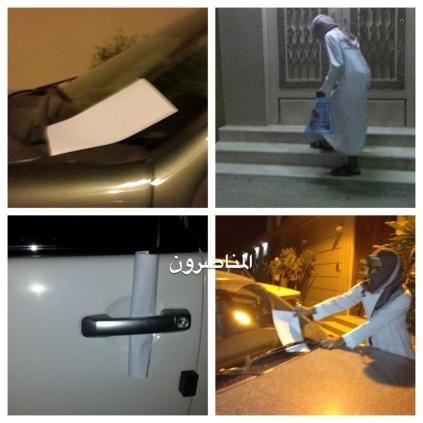
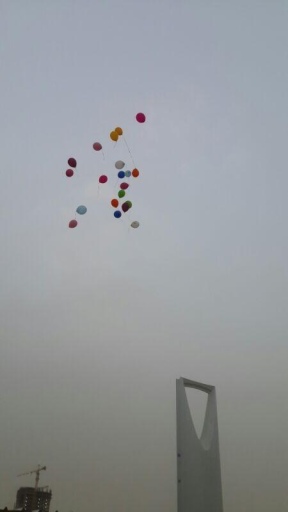
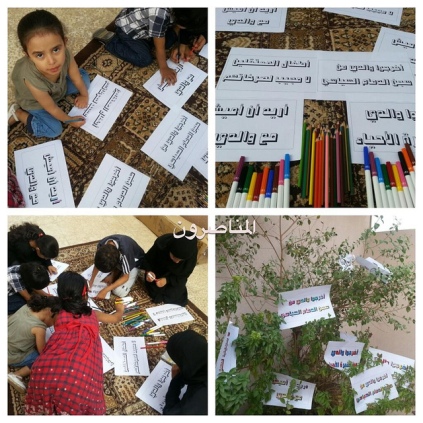
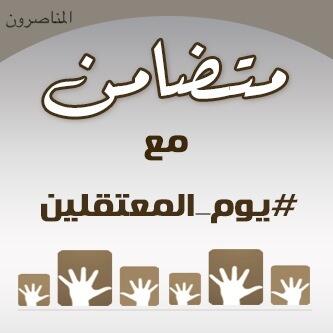
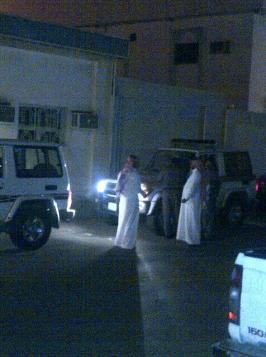
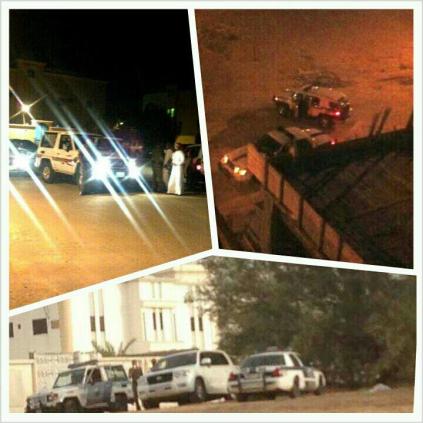
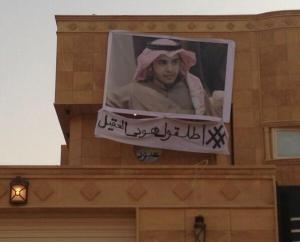
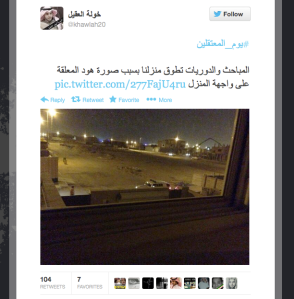
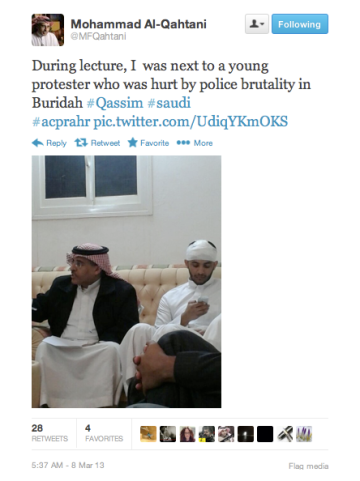
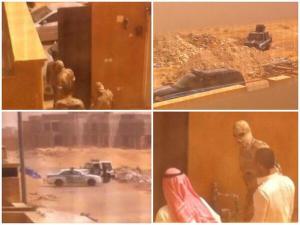
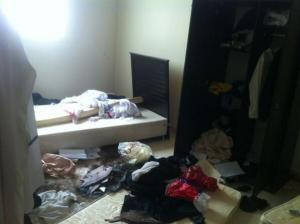

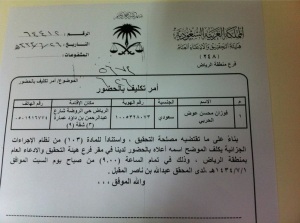
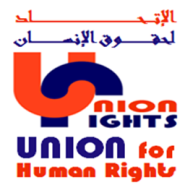
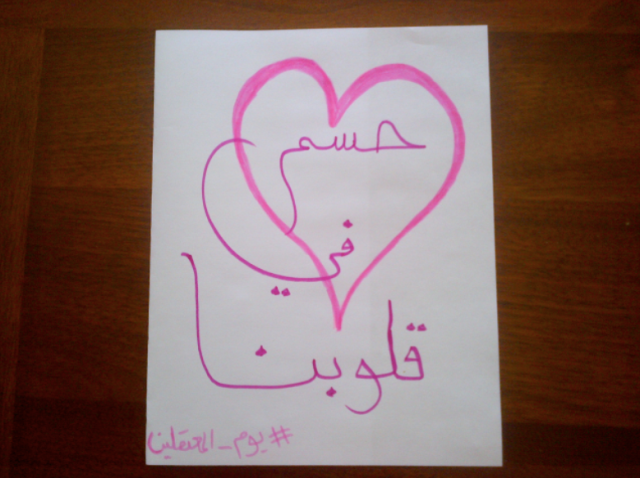
Hamza Kashgari is also illegally detained….
Pingback: Saudi Families of Detainees Mark “Third Detainees Day” · Global Voices
Pingback: Saudi Families of Detainees Mark ‘Third Detainees Day’ | OccuWorld
Pingback: السعودية: أسر المعتقلين تعسفياً تحيي يوم المعتقلين الثالث · Global Voices الأصوات العالمية